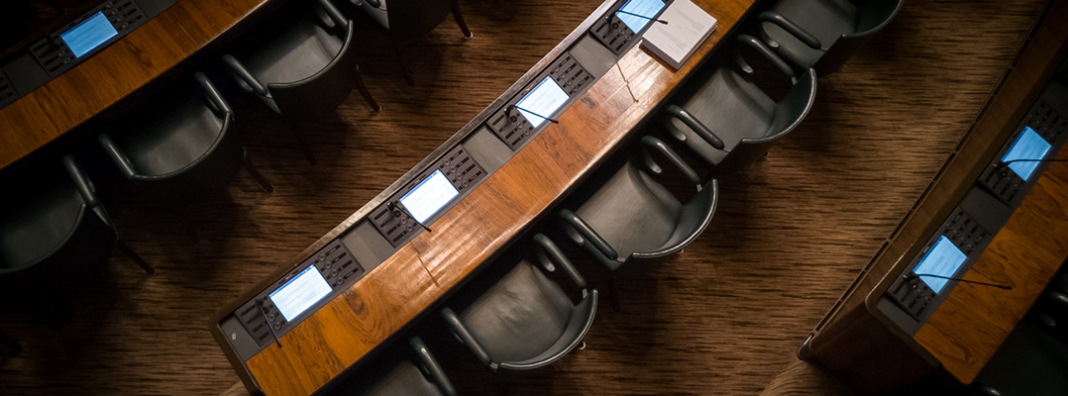
CEOs from Facebook, Google, Amazon, and Apple are set to appear before the House Antitrust Subcommittee today to discuss competition on their platforms. This hearing will vary dramatically in the key questions and policy remedies posed to each company. The following FAQ helps cut through the noise.
Why is the Antitrust Subcommittee hauling in these tech CEOs?
In a joint statement, House Judiciary Committee Chairman Jerrold Nadler and Antitrust Subcommittee Chairman David Cicilline explained the purpose of this hearing,
Since last June, the Subcommittee has been investigating the dominance of a small number of digital platforms and the adequacy of existing antitrust laws and enforcement. Given the central role these corporations play in the lives of the American people, it is critical that their CEOs are forthcoming. As we have said from the start, their testimony is essential for us to complete this investigation.
Each of the four companies face dramatically different competitive concerns. Facebook will likely be grilled over its acquisition of WhatsApp and Instagram, as well as efforts “by Facebook to cut off companies from its social graph.” Google is under investigation by a group of state attorneys general and the Department of Justice (DOJ) for its ad business. Amazon’s Jeff Bezos will be questioned on a Wall Street Journal report that suggested employees could access third-party seller data. However, the company said that its teams were restricted from it. Finally, Apple will be interrogated about the commission it charges for the app store.
What are the worries about Facebook’s mergers?
When Mark Zuckerberg last faced congressional scrutiny, the toughest questions came from Senator Lindsey Graham, who wondered, “Car companies face a lot of competition: they make a defective car, it gets out in the world, they stop buying that car and buy another one. Is there an alternative to Facebook in the private sector?” Implicit in the Senator’s line of questioning was the 2012 acquisition of Instagram by Facebook, as well as the company’s buyout of WhatsApp in 2014 that seemed to have taken out two competitors.
Competition in digital markets differs from standard logic. Importantly, there aren’t prices on the content side of the market, which allows users to sign up for many different platforms, a tendency known as multihoming. In the attention economy, exiting the service becomes a strong signal of consumer choice. Since the Cambridge Analytica story broke, roughly 15 million people have left Facebook and those that have stayed on spend four fewer minutes per day on the site. CGO estimates suggest that consumers have taken back nearly $200 billion of their time.
Should Facebook be broken up?
To remedy a perceived lack of competition in social media, some have suggested breaking up Facebook, but this would be the wrong move. In one of the few papers that modeled a breakup of Facebook, consumer surplus dropped by 44 percent. For regulators, a breakup would be a logistical nightmare. As I explained in another context,
Any trust-busting action would also require breaking up the company’s technology stack — a general name for the suite of technologies powering web sites. For example, Facebook developed its technology stack in-house to address the unique problems facing Facebook’s vast troves of data. Facebook created BigPipe to dynamically serve pages faster, Haystack to store billions of photos efficiently, Unicorn for searching the social graph, TAO for storing graph information, Peregrine for querying, and MysteryMachine to help with end-to-end performance analysis. The company also invested billions in data centers to quickly deliver video, and it split the cost of an undersea cable with Microsoft to speed up information travel. Where do you cut these technologies when splitting up the company?
A less stringent option would force Facebook to allow consumers to export all of their data. While Facebook does allow for information to be exported currently, it is thought that a more expansive policy would yield more competition in social media. However, engineers working in this segment of the industry are far more skeptical of the idea, telling researchers that, “Ported data is simultaneously insufficient to replicate Facebook and too tailored to Facebook to be useful for much else.” Regulatory proposals aiming to split up tech assets share a common flaw in assuming that they can easily be adapted for other uses or by competitors, which is simply not the case.
What are the concerns with Google’s ad business?
Spurred by ongoing investigations by state attorneys general and the DOJ, Google CEO Sundar Pichai will be in the hot seat today for his company’s advertising business. But, by a number of common measures, online advertising actually looks quite competitive. Ad prices have seen a dramatic drop in the past decade, according to the Bureau of Labor Statistics, and are now nearly half their 2009 level. Amazon is eating into the online ad shares of both Google and Facebook and is projected to be about 10 percent of the total market next year. Additionally, just this month, TikTok opened up advertising to the United States. On its face, then, the market doesn’t show clear signs of a problem.
Should Google’s mergers be reversed?
Some have suggested that Google should be forced to spin off its acquisition of DoubleClick and AdMob. Policymakers should be careful when trying to translate lessons from a previous era of antitrust onto digital markets because information exhibits unique qualities. Concentration in the ad market, for example, gives ad buyers better information, allowing for more efficient targeting of keywords. In other words, concentration seems to have a negative effect on the search engine’s revenues, which would be reversed if ad tech deals were undone.
Another flawed move would simply stop all further acquisitions by the company. Not only would this sidestep the critical work of merger review at the DOJ and the FTC, but this kind of rule also misconstrues the purposes of mergers and acquisitions. Most deals aren’t consummated to stop competitors, but to buy innovative ideas and talent, which has the end effect of being pro-consumer. As a previous CGO report noted,
Google’s acquisition of Android in 2005 serves as one example. Today, the deal seems like a smart move, but at the time Eric Schmidt was uncertain where the company would fit into Google. He was skeptical of the purchase which was orchestrated by Larry Page and Sergey Brin. Both Page and Brin had a vision for mobile and acquired Android, which had no viable product in 2005 and put Android’s Andy Rubin and Rich Miner at key places within the company. With Google’s resources on its side and the talent gained in the deal, Android launched and has since become the largest mobile operating system, a clear win for consumers.
Is Amazon a dominant retail platform?
In April, the Wall Street Journal broke the news that executives of the retail company had violated company rules regarding data usage. According to the report, executives allowed teams to access private data from third-party sellers on the site to build competing products. What is less clear is how extensive the practice is, since company representatives told Congress that safeguards were in place to prevent such a thing from happening.
Amazon will also be questioned over its market share in online retailing. eMarketer estimates that the online retailer will capture about 39 percent of all e-commerce sales this year. But market definitions matter, and if the broader retail market is included, not just online sales, then that share drops precipitously to about 6 percent. While Amazon is projected to grow in the upcoming years, the online retail market is far from being static. The Canadian company Shopify burst into broader recognition this year, driven by a stellar year in 2019 and continued growth as brick and mortar stores have moved payments online in response to COVID.
Should Amazon be regulated like a public utility?
Last year, Senator Elizabeth Warren laid out a plan to regulate Amazon through platform utility regulation. If this policy were enacted, companies with annual global revenue of $25 billion or higher that provide an online marketplace, an exchange, or a platform would be broken up. At the same time, all similar businesses, regardless of size, would be subject to a new series of regulations.
This proposal, and others like it, will spark years of litigation. As I noted before,
[A]ll platforms would be required to engage in “fair, reasonable, and nondiscriminatory dealing with users,” swinging open the door to regulation. Because these terms are hard to define, an agency would need to be given wide latitude, much like the amorphous public-interest standard at the Federal Communications Commission (FCC). As former FCC Commissioner Glen Robinson explained, this standard “is vague to the point of vacuousness, providing neither guidance nor constraint on the agency’s action.” Something similar would be expected for platform regulation under this proposal.
Is Apple’s pricing on the App Store of concern?
While Apple is nominally a tech company, the Antitrust Subcommittee seems to be interested in understanding if the current pricing model, which assesses a 30 percent commission for specific kinds of apps, is harming competition. Confusion abounds over this system because countless apps are simply not included in the commission schedule. Free apps and apps that use advertising aren’t included, which includes Google, Facebook, Instagram, and Twitter, as well as some users of Pandora and Spotify. Apps that are considered “readers” are also not subject to the pricing scheme. Readers are defined as those apps where users purchase or subscribe to content through a source outside of the app, but consume it through an Apple product. This category includes many users of Spotify in addition to Netflix and Kindle.
As legal scholar Ben Sperry explained, apps that have the 30 percent commission are relatively limited. This list includes:
- paid apps, which covers countless games;
- free apps with in-app purchases;
- free apps with digital subscriptions like Pandora, Hulu, and some select Spotify users; and
- cross-platform apps, such as Dropbox, Hulu, and Minecraft, which allow for digital goods and services to be purchased in-app, although the commission is limited to Apple products.
Should Apple be forced to change its commission rate?
While Spotify has been particularly outspoken in its opposition to Apple’s pricing practices, the 30 percent cut is an industry standard. Amazon’s Appstore, Google’s PlayStore, and the Microsoft Store all take 30 percent. Most of the large gaming platforms follow this breakdown as well. The Playstation Store, XBox Games Store, Nintendo eShop, Steam, and Epic Games Store all split the revenue 70–30. In other words, Apple’s inclusion in this subcommittee hearing, given what has been reported thus far, seems misplaced.
What’s next for the Antitrust Subcommittee?
Today’s hearing will surely include much more than the intended topic of platform competition. But representatives should stay the course and keep themselves from straying into privacy issues and speech concerns. While tech companies need to be held accountable when they harm consumers, this hearing should be used for its intended purpose, to answer lingering questions that would help close the investigation and issue the committee report.
While this report is sure to include suggested legislative changes, members of Congress need to be careful. As I cautioned in an op-ed that appeared in The Hill in March,
[T]he FTC and the Department of Justice are investigating the biggest names in tech, including Amazon, Apple, Google, and Facebook. We should wait until these investigations have run their course. Only then will we know if the laudable intentions behind this recent reform proposal will actually tackle the problem.
That game plan is still the best one.

